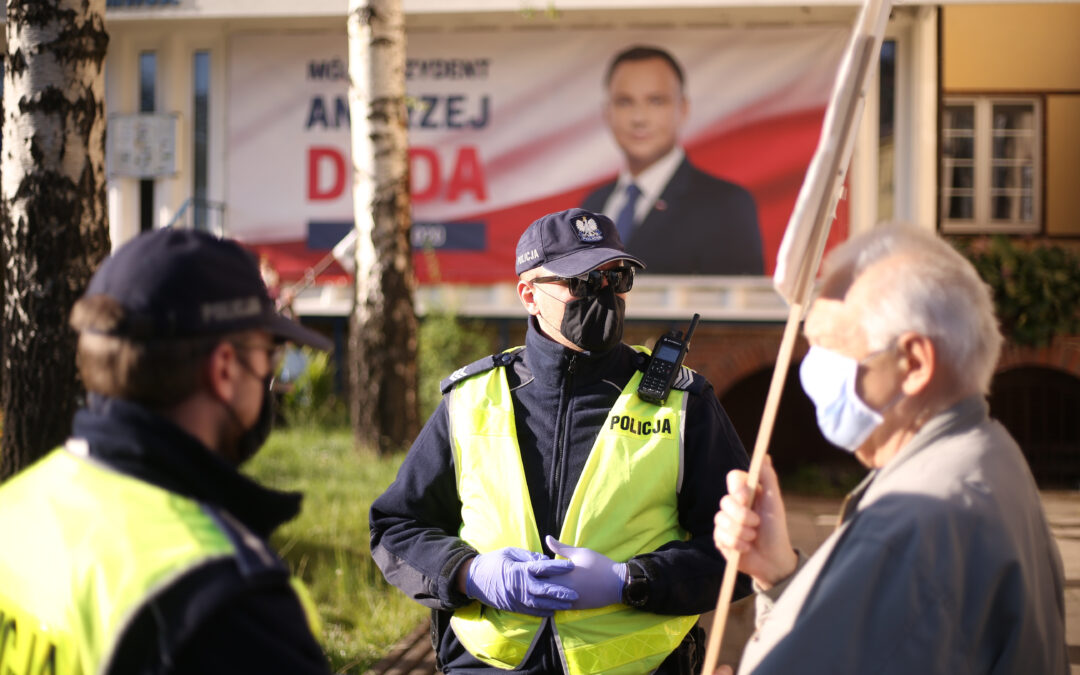A 20-year-old woman who was earlier this year convicted for insulting the president – a crime in Poland that carries a potential prison sentence of up to three years – has had her guilty verdict overturned.
The appeals court found that her remarks – in which she shouted “F**k Duda” (“Je..ć Dudę”) at an election rally – constituted an objection to Andrzej Duda’s candidacy in elections rather than an insult towards him as president.
“Freedom of expression is one of the foundations of a democratic society,” said the judge in a justification for the ruling.
The case relates to an incident that took place in July last year, ahead of the second round of Poland’s presidential election, in which Duda narrowly won a second term in a run-off against opposition candidate Rafał Trzaskowski.
At one of Duda’s rallies in the small town of Nowy Sól, a woman – named only as Wiktoria K. under Polish privacy law – was among protesters expressing opposition to him. She was caught on camera shouting the obscenity in question.
Following an investigation, Wiktoria K. was detained by police at her workplace, held at a police station, and then taken for questioning by prosecutors. She had initially been told she would be questioned as a witness, but after being detained was charged with insulting the president.
At a trial in March this year, she was found guilty of that crime. The judge, however, decided not to give her any punishment, noting that she had already faced punishment in the form of abuse both on the internet and in public since the incident.
Wiktoria K. nevertheless decided to appeal against her guilty verdict. Her lawyers argued that she had expressed her opposition to Duda as an election candidate at one of his rallies, rather than as head of state.
In a binding ruling issued today, the appeals court in Poznań acquitted her and ordered the state to pay the costs of the case.
In a justification for the ruling, judge Przemysław Grajzer noted that insult is not the same as mere contempt for a person, and that “it is possible to insult the President of the Republic of Poland only with direct intent”, reports TVN24.
“Taking into account where the act took place – that is, at an election rally – it is obvious that the expression was an objection by Wiktoria K. to Andrzej Duda’s candidacy for president,” continued Grajzer.
In separate proceedings from her criminal case, Wiktoria K.’s lawyers earlier this year also successfully argued that police had acted excessively and unlawfully by detaining Wiktoria K. A judge found that she should have simply been called in for questioning and awarded her compensation.
Wiktoria K’s is one of a number of cases to be brought recently under Poland’s law against insulting the president. In June this year, three high-school students were sentenced to community service for destroying one of Duda’s election posters and shouting “F**k Duda” at an end-of-year party.
The same month, an evangelical pastor was found guilty of insulting the president for calling him, among other things, a “traitor”, “coward” and “agent” working on behalf “of Moscow and Berlin”.
In March, a writer was indicted for calling the president an “idiot” in a social media post. Last year, a man was sentenced to community service for drawing a penis on one of Duda’s election posters while drunk, and another man was charged for calling the president an “idiot”.
The law against insulting the president has also frequently been used in the past, including under the presidencies of Duda’s two most recent predecessors, Bronisław Komorowski and Lech Kaczyński.
The ban on insulting the president is one of a wide range of defamation and insult laws in Poland, which are among the broadest and strictest in any democratic country, according to a study by the OSCE.
In recent years, there have also been a growing number of indictments for the crime of “offending religious sentiment”, which can be punished with up to two years in prison.
Main image credit: Cezary Aszkielowicz / Agencja Gazeta

Daniel Tilles is editor-in-chief of Notes from Poland. He has written on Polish affairs for a wide range of publications, including Foreign Policy, POLITICO Europe, EUobserver and Dziennik Gazeta Prawna.




















